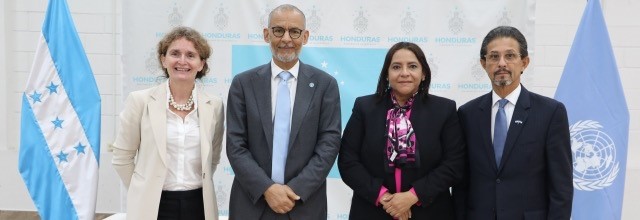Strengthening collaboration on agrifood investment in Latin America and the Caribbean

Food security, sustainability and the ability to adapt to a changing climate are top priorities for Latin America and the Caribbean.
One way to support the region’s countries in achieving these goals is by scaling up agrifood investments that promote inclusive economic growth, better diets and nutrition and a healthier planet.
With that in mind, FAO Investment Centre Director Mohamed Manssouri and Ekaterina Krivonos, the Centre’s new Service Chief for Latin America and the Caribbean, travelled with colleagues to Chile, where the FAO Regional Office is located, as well as Honduras and Panama earlier this year.
Their goal was to discuss investment priorities and communicate on FAO’s expanded investment support, including through the Hand-in-Hand initiative.
The group met with the countries’ Ministries of Agriculture, colleagues from the FAO regional and country offices, and international and regional financing partners like the World Bank, the International Fund for Agricultural Development, the Inter-American Development Bank (IDB) and the Central American Bank for Economic Integration.
They also met with the private sector, including small-scale farmers.
“We need to work with all stakeholders to identify investment solutions that are best adapted to our Member countries,” Manssouri said, “and that put agrifood systems on more sustainable and resilient paths.”
Seizing opportunities, tackling challenges
FAO has been supporting investment in Honduras through the Hand-in-Hand initiative, namely in building a more resilient bean value chain, improving coffee quality and coffee farmers’ incomes, and strengthening sustainable cocoa production and processing.
During the Centre’s mission, FAO Honduras organized a forum to discuss agrifood investment trends and challenges in the context of multiple crises like climate change, conflicts and volatile food, fertilizer and fuel prices.
Panelists, including Manssouri and the Minister of Agriculture of Honduras, pointed to the strategic long-term vision, policies and investments needed to fuel inclusive agricultural growth.
These include investing more in improving extension services and smallholder farmers’ access to markets, developing rural infrastructure, strengthening processing capacities for higher value addition and empowering women.
Investing in sustainability
Farmers across the region are struggling with degraded soils, biodiversity loss and plant disease and pests. One solution could be to increase the use of inputs from beneficial organisms.
Bio-inputs can improve soil health and plant growth, protect biodiversity, strengthen resilience to climate change and provide ecosystem services.
FAO has been working to link producers with bio-input markets to ensure small-scale producers can access these inputs at affordable prices.
In Panama, the FAO group participated in the first ever Pan-American Bio-inputs Forum to share knowledge, foster partnerships and identify investment opportunities around this emerging area.
They even had a chance to see how local farmers are successfully using bio-inputs to improve crop productivity and sustainability.
The group also met with Indigenous coffee growers who are working to boost coffee production, quality and producers’ incomes.
Many of these coffee growers participated in season-long farmer field schools on more sustainable agroecological practices, supported by FAO and the IDB.
Diversifying and expanding investment support
For Krivonos, the overall trip helped plant the seeds for stronger collaboration on priority investment areas in the region – from climate resilience, green finance and rural development to market access and digital agriculture.
“This is an exciting time for the Centre, as we are expanding our outreach and fostering more strategic collaboration across FAO and with new and longstanding partners,” she said. “This will help us strengthen investment planning and find innovative solutions that can help the region’s countries advance their food security agendas.”
